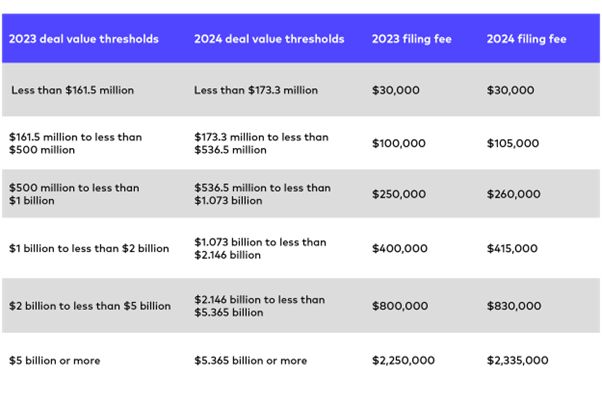The Hart-Scott-Rodino (HSR) Act thresholds that govern which mergers & acquisitions must be reported to the US Department of Justice (DOJ) and Federal Trade Commission (FTC) will increase slightly more than 7% in February 2024.
The key minimum "size-of-transaction" threshold will increase from $111.4 million to $119.5 million. The increases, which are based on changes in the US gross national product (GNP), are expected to go into effect in late February 2024, thirty days after their publication in the Federal Register.
The HSR Act requires that parties to proposed mergers & acquisitions, including acquisitions of voting securities and assets, notify the DOJ and FTC and observe a statutory waiting period before closing if the transaction meets specified "size-of-person" and "size-of-transaction" thresholds – and does not fall within an exemption to the HSR Act.
The waiting period, which is 30 days for most transactions, historically has been terminated early when transactions do not present substantive issues, but the Biden administration has stopped granting early terminations for most transactions since February 2021.
In addition to increasing the minimum "size-of-transaction" threshold, the most significant adjustments are the following:
- The "size-of-person" tests will increase from $22.3 million to $23.9 million and from $222.7 million to $239 million, with respect to the required level of annual net sales or total assets.
- The larger "size-of-transaction" threshold, which is applicable even if the "size-of-person" test is not met, will increase from $445.5 million to $478 million, meaning that acquisitions valued at more than $478 million must be reported regardless of whether the "size-of-person" threshold is met (unless an exemption applies).
Adjustments also will be made to the six-tiered filing fee structure implemented last year by the agencies. The adjustments made to the deal value thresholds and fees are based on changes in the Department of Labor's Consumer Price Index (CPI) for the year ending September 30 over the previous year (unlike the HSR filing thresholds, which are adjusted based on changes in GNP).
The current and new HSR filing fees are as follows:

Earlier this month, the FTC announced an adjustment to the maximum daily civil penalty for HSR violations, which is adjusted for inflation and calculated based on changes in the CPI for all urban consumers from October to October. The current maximum daily civil penalty is now $51,744 per day, up from $50,120 and effective as of January 10, 2024.
The FTC also announced revised dollar thresholds applicable to the size criteria applied under Section 8 of the Clayton Act, which governs the legality of interlocking directorates and is adjusted based on changes in GNP.
Under the updated Section 8 thresholds, interlocks may be prohibited if each corporation has capital, surplus and undivided profits aggregating more than $48,559,000 (up from $45,257,000), with an exception if the competitive sales of either corporation are less than $4,855,900 (up from $4,525,700). The revised levels for these thresholds were effective as of January 22, 2024.
HSR filing analyses and determinations of which interlocking directorates may violate Section 8 of the Clayton Act are highly technical. If you have questions, please reach out to a member of your Cooley corporate or antitrust team.
The content of this article is intended to provide a general guide to the subject matter. Specialist advice should be sought about your specific circumstances.




